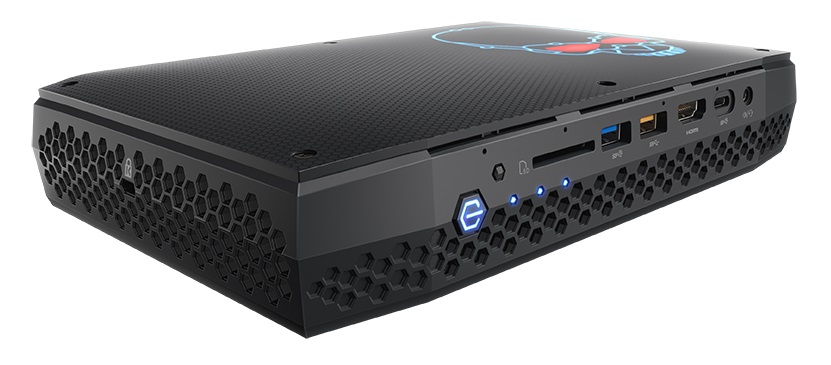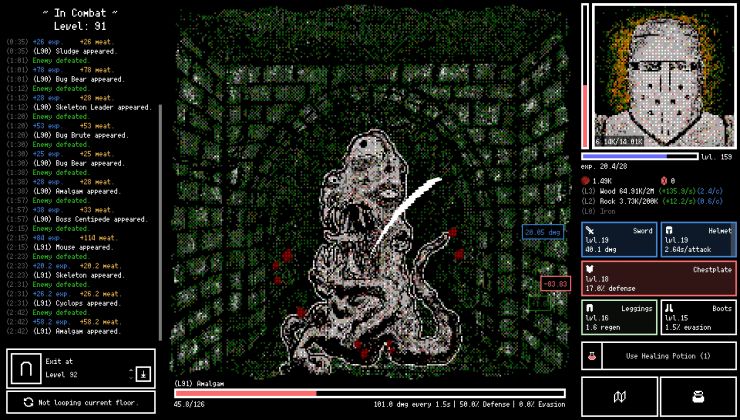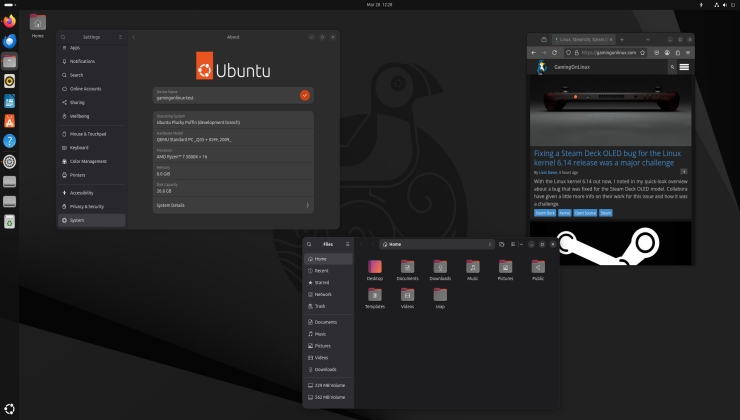Intel launches their new CPUs with Radeon RX Vega M Graphics along with two new 'NUC' mini-pc models
Yesterday, Intel officially announced the release of their new CPUs that come with Radeon RX Vega M Graphics. On top of that, they've launched two new NUC models (their mini-PCs).
The first two new CPUs released are these, which are aimed at laptops, mini-PCs and that sort of thing:
- 8th Gen Intel Core processor with Radeon™ RX Vega M GL Graphics (65W total package power)
- 8th Gen Intel Core processor with Radeon™ RX Vega M GH Graphics (100W total package power), which features an unlocked configuration
Maybe something to look for in your next laptop? See the full announcement here.
On top of that, Intel also released their latest NUC which comes in two versions the NUC8i7HVK and NUC8i7HNK, not the most memorable of names, but they're interesting bits of hardware. The NUC8i7HVK comes with the Radeon™ RX Vega M GH while the NUC8i7HNK uses the Radeon™ RX Vega M GL.
I have to admit, I really do love the look of these new NUC systems. They come with loads of connectivity options too like front and rear HDMI, two rear mini-DisplayPort and two rear Thunderbolt USB-C ports. Plenty of USB ports on the front and back, an SDXC slot, two M.2 22x42/80 (key M) slots for your SATA3 or PCIe x4 Gen3 NVMe or AHCI SSD and more.
More on the new NUC models here, you can also see the full spec sheet here.
I know it takes years.. but really I can't help but feel they should focus on fixing their existing shit first rather than release new shit that meltdowns.Well, the existing stuff essentially cannot be fixed, the flaws run too deep. They can be mitigated but ultimately entirely new designs are needed which indeed takes a good while to get going. These CPUs were announced a while back and designed even further back so just canning them until the architecture is fixed is probably a big waste of money.
Although it is a good point to bring up that these CPUs are likely just as susceptible to Meltdown and Spectre as their previous offerings. Personally I wouldn't upgrade my CPU in a good while to ensure an upgrade to an architecture that has these flaws fixed.
Rumor has it though that AMD is going to launch a similar chip with Ryzen also... probably as part of their deal to allow Intel to use their graphics in this.
Besides that... yeah Intel did some pretty shitty PR when it comes to Meltdown/Spectre, but this entire debacle very much sounds like someone a decade ago cut some corners to get a few percent extra speed (still mattered a bit more back then) with the assumption that there wouldn't be a practical way to exploit it. And nearly the entire industry seems to have thought along similar lines, given how wide-spread the general issue is. In hind-sight not great, but it's not really anything to get angry towards Intel about.
Edit: Obligatory xkcd: https://xkcd.com/1938/
Last edited by Julius on 8 Jan 2018 at 12:12 pm UTC
Won't make a dent in their budget ofc but I've gotten better at putting my money where my mouth is, so I even buy Linux games I don't really plan on playing :P
The Meltdown vulnerability was the final straw. I completely lost hope in Intel. It's too late to bring me back (and many others).
I understand your feelings, but if that's how you feel, then you shouldn't use computers. There's always a bug/vuln/exploit in your hardware and/or software. You can definitely get upset with Intel's leadership on aspects of the Meltdown issue, but more often than not (Developer AND Systems Engineer here) it simply hadn't been found until last June/July. There's a lot that goes into looking into what needs to be done to fix an issue once it's found without breaking too many things on a system.
Another HUGE thing to note when it comes to Security issues is that there is a difference between potential risk and actual risk. The potential risk of both Meltdown and Spectre are pretty scary and can be huge issues, but as was discussed at work the other day (I work at a Managed Security Services Provider), the chances of Meltdown and Spectre being successfully exploited is going to entirely be based on a couple of key points:
- How secure external facing systems are - this will be where the new patches MUST be installed, without exception
- Are firewalls blocking certain types of return traffic - this one depends on several factors, but making sure that any unexpected types of network traffic flowing from your home or work network are blocked by default.
- Are users' browsers up to day - really important one, probably more so than the firmware mitigations and the kernel updates since many of the risks associated with the exploits (specifically Spectre) are through browsers
- Are you/have you been susceptible to Social Engineering/Phishing in the past? - Ties back to the firewall comment a bit. These exploits are only going to be easy to execute against people and businesses where their security at the edge (Firewall, Modem, Router) is lax OR they are extremely susceptible to Social Engineering/Phishing. Attackers have to get access to your machine before they can exploit it, which is much harder to do if the network devices are secure and users are being smart with their email.
Of course the above doesn't account for everything, nor does it mean you shouldn't patch your system (I'm definitely NOT advocating for that). That said, as someone working in the InfoSec arena, I can tell you that there is a business behind making these things seem scarier than they practically are (not to mention it makes for good news stories). I can also tell you that the Spectre exploit is far more scary than Meltdown due to the fact that it's a bit more complicated to fix and has multiple attack entrance points. Spectre is also the one that DOES affect AMD as well as Intel and ARM. The performance issues from Meltdown on Intel are going to be entirely workflow dependent and probably affect businesses (like my job) where there is extremely high amounts of data and/or processing being done on the systems.
Last edited by EagleDelta on 8 Jan 2018 at 3:22 pm UTC
The Meltdown vulnerability was the final straw. I completely lost hope in Intel. It's too late to bring me back (and many others).
I understand your feelings, but if that's how you feel, then you shouldn't use computers. ]
The way Intel handled this wasn't bad PR, it's a catastrophe. They were notified in June, did pretty much nothing except push harder for Kaiser (now KPTI in Linux, the fix) to be implemented in various places they had influence.
More damning is one of their chief engineers dumping over $50M of Intel stock this year. Intel are saying "it was a scheduled stock movement", but in fact, it was scheduled in October, long after disclosure of Meltdown in June.
And if you want a conspiracy theory, apparently Intel, as early as January this year, were pushing hard for KASLR adoption across the industry - KASLR is the predecessor to the KPTI/Kaiser fix for Meltdown. So it looks like Intel saw this bombshell coming from a long way off... but continued to sell their faulty processors without any disclosure.
I expect they've just lost a massive amount of pricing power with their (big) cloud customers who will be rightly pissed at their attitude. Playing their cards so close to their chest and the stock dump after disclosure is the icing. I imagine there will be huge lawsuits out of this, and possibly some jail time for insider trading if the SEC get involved.
Fun and games.
I understand your feelings, but if that's how you feel, then you shouldn't use computers.Such a long post to justify something that actually could be avoided if testing before releasing were done properly, then Intel jumping into new models and products while old stuff is still broken isnt good. Im pretty sure intel will keep pushing new stuff in order that people forget about this meltdown problem because they cant fix it, those models are just too deep broken.
"I understand your feelings" no you dont, and stop telling people to stop using something just because they expect quality and responsibility from manufacturers.
I understand your feelings, but if that's how you feel, then you shouldn't use computers.Such a long post to justify something that actually could be avoided if testing before releasing were done properly, then Intel jumping into new models and products while old stuff is still broken isnt good. Im pretty sure intel will keep pushing new stuff in order that people forget about this meltdown problem because they cant fix it, those models are just too deep broken.
"I understand your feelings" no you dont, and stop telling people to stop using something just because they expect quality and responsibility from manufacturers.
Except that it's not that simple. No amount of pre-release testing can guarantee the finding of fringe, real-life edge cases. That's just the nature of things. And it's not just Intel that ends up with these types of issues. Any hardware or software manufacturer can make mistakes that only show up after release, and sadly, there is no perfect debugging or testing method. It's just not a realistic expectation. All that can be done is to learn from the mistakes and try and avoid them next time around, which Intel is actively trying to do.
I understand your feelings, but if that's how you feel, then you shouldn't use computers.Such a long post to justify something that actually could be avoided if testing before releasing were done properly, then Intel jumping into new models and products while old stuff is still broken isnt good. Im pretty sure intel will keep pushing new stuff in order that people forget about this meltdown problem because they cant fix it, those models are just too deep broken.
"I understand your feelings" no you dont, and stop telling people to stop using something just because they expect quality and responsibility from manufacturers.
The flaw isn't something that could be tested for. It's an inherent design flaw, a bad decision made in the name of performance. Their reasoning would largely have been "Well, who the hell is going to manage to exploit that?"
Everyone here should read this [thread on twitter explaining meltdown and spectre](https://twitter.com/gsuberland/status/948907452786933762) instead of making these weird armchair assessments.
The one thing I agree on is that Intel handled it bloody poorly.
I understand your feelings, but if that's how you feel, then you shouldn't use computers.Such a long post to justify something that actually could be avoided if testing before releasing were done properly, then Intel jumping into new models and products while old stuff is still broken isnt good. Im pretty sure intel will keep pushing new stuff in order that people forget about this meltdown problem because they cant fix it, those models are just too deep broken.
"I understand your feelings" no you dont, and stop telling people to stop using something just because they expect quality and responsibility from manufacturers.
The flaw isn't something that could be tested for. It's an inherent design flaw, a bad decision made in the name of performance. Their reasoning would largely have been "Well, who the hell is going to manage to exploit that?"
Everyone here should read this thread on twitter explaining meltdown and spectre instead of making these weird armchair assessments.
The one thing I agree on is that Intel handled it bloody poorly.
Apart from someone trying to use Twitter to explain such a technical subject, I completely agree with you. BUT, while that design decision was made as long ago as 1995 when security was 99th on a list 100 priorities, this is 2018 now and Intel (and AMD and probably to a certain extent ARM) can only be described as wilfully negligent in overlooking this behaviour in the modern day.
As I said earlier, I suspect that Intel knew about this much earlier than June, probably for years and kept a lid on it. Their pushing KASLR so hard (for unrelated attacks, such as KRACKS and the whole Intel ME cock up) was probably done in the hope that a software remedy would be found and accepted early, so that they wouldn't have to acknowledge the extent, reach and scope of this hardware design flaw.
I'm not a fan of the The Register, but they sum it up pretty perfectly here:
Recent reports that these exploits are caused by a “bug” or a “flaw” and are unique to Intel products are incorrect.
Translation: Pleeeeeease, pleeeeease do not sue us for shipping faulty products or make us recall millions of chips.
Before the kernel devs called their Kaiser implementation KPTI, they were mulling over whether to call it FUCKWIT. I think that tells its own story!
Also as far as i got it 2 flaws found are documented but they where talking about a 3rd which i didn't hear anything so far.
Last but not least, once you read this documents you will find that KTPI makes it harder to use meltdown as an attack but not impossible.
So a few thinks are on my mind:
- the highest actuall speed to read out the memory on meltdown is 500kb/s. Now calculate how long it would take to make a snapshot of your memory and how much this memory is changed during this progress. So even now i would say you need to much further improve this attack to be able to have a real usuable attack for attacking private pc's.
- For cloud and infrastructure this is a whole different story. If you attack them any information is valuable.
Also ... meltdown is mostly intel only but even on amd exists a attack which can use the architectual design of modern cpu's. So while not called meltdown there is something else.
So basically any modern cpu is probably affected and most cpu producers have already told they are affected by one or another attack. So conclusion -> out of order execution opens a whole bunch of attack vectors on modern cpu's. It's now time to work against it and once we see the different solutions we can decide who offers a good solution.
Apart from someone trying to use Twitter to explain such a technical subject, I completely agree with you. BUT, while that design decision was made as long ago as 1995 when security was 99th on a list 100 priorities, this is 2018 now and Intel (and AMD and probably to a certain extent ARM) can only be described as wilfully negligent in overlooking this behaviour in the modern day.
As I said earlier, I suspect that Intel knew about this much earlier than June, probably for years and kept a lid on it. Their pushing KASLR so hard (for unrelated attacks, such as KRACKS and the whole Intel ME cock up) was probably done in the hope that a software remedy would be found and accepted early, so that they wouldn't have to acknowledge the extent, reach and scope of this hardware design flaw.
Again, you're assuming that Intel, AMD, and ARM knew about the risk/flaw before they were notified of it. I can tell you now that in most cases they don't know until someone notifies them. There are specific procedures for reporting bugs/flaws that lead to vulns/exploits. To the point where the MSSP I work for has explicity told me that the one thing I cannot do when contributing back upstream is open an issue/ticket on a public issue tracker if the issue is security related. It must be researched, evaluated, and sent to the project/organization/company directly until the risk of the issue is known and can be safely released to the public.
Are there other things Intel should have done related to how the PR was handled regarding the Meltdown and Spectre exploits - absolutely. But don't pretend to know all the ins and outs of how this works. I'm in the InfoSec field and even I don't know everything.
If you are an average Joe, I'm sure They will not spy You, but If You are a politician in a high position, You should be worried about this.
This has been going for 10 years. 10 years and none of their skilled engineers noticed? I find it kinda hard to believe that. They either did not care enough about finding the problem, or they tried to hide it.
It's not like there's a huge open door (like Apple had some weeks ago with their root logins). People have invented an extremely clever way to expolit hardware features (and yes, I could hardly call them bugs). I'm a software developer myself and I had no idea how they would tunnel data from the predictive execution branch (which is not going to save any data were it can be read) through to legitimate code. This cache data tunneling is so sophisticated and I didn't even yet look how they manage to delay the memory exception...
That's why AMD's latest chips don't suffer from the Meltdown flaw. Yes, they use Speculative Execution, but at least they have the good grace to check if they're allowed to execute those speculative commands before they do so.
Spectre is more widespread. It's also a Speculative Execution vulnerability but has nothing to do with checking privileges. But you have to have some kind of capability on the box first, before you can take advantage of Spectre - you have to have some way to influence the buffer cache.
But yeah, in summary - total bug.
And yes, I am assuming that Intel knew about this years ago. I'm assuming that based on the "conspiracy theory" I mentioned in my earlier comment. Might be true, no idea.
I understand your feelings, but if that's how you feel, then you shouldn't use computers.Such a long post to justify something that actually could be avoided if testing before releasing were done properly, then Intel jumping into new models and products while old stuff is still broken isnt good. Im pretty sure intel will keep pushing new stuff in order that people forget about this meltdown problem because they cant fix it, those models are just too deep broken.
"I understand your feelings" no you dont, and stop telling people to stop using something just because they expect quality and responsibility from manufacturers.
Tom Lendacky of AMD agrees with you.
I see posters here saying things like: It's an unforeseen bug or it could happen to anyone.
The bottom line is Intel played fast and loose with security just to squeeze some more
performance out of their chip design. Take a look at this quote from Tom.
The AMD micro-architectureThat implies Intel is allowing unprivileged processes to reference speculative data from
does not allow memory references, including speculative references, that
access higher privileged data when running in a lesser privileged mode
when that access would result in a page fault.
higher ring processes. That is by definition a very bad design choice.
For mITX computers it's indeed different: There's no "dedicaded option" that's soldered on the Mainboard - a dedicaded GPU will always take space and create a lot of extra heat. In this specific use case it can make sense. The only downside: It will be hard / impossible to upgrade this combo as far as next-gen "APUs" won't fit most likely.
Just to be clear here - Meltdown is a vulnerability that takes advantage of a bug in Intel's chips. Call it a "design flaw" if you're feeling kind, but it's a hardware bug.
However, this is a case where the semantics of "Design flaw" vs "Bug" is important. A "Bug" implies the core issue can be fix though some sort of code update (be that firmware or software). The fact that it is a design flaw means that Intel cannot fix the issue now without stopping all business, which would probably cause a loss of sales too high to continue. What they did (outside of PR) is the best thing they could've done in the circumstances: Notify Software vendors and help with patches that mitigate or block the design flaw, followed by steps to designing new chips to not have that flaw..... the key problem with that is this: Designing, building, coding and releasing new CPUs is a multi-year process and we won't see a CPU from Intel for some time that no longer has that flaw.
And yes, I am assuming that Intel knew about this years ago. I'm assuming that based on the "conspiracy theory" I mentioned in my earlier comment. Might be true, no idea.
I can't (and won't) argue with this. All I can say is that I require hard facts before I will make this assumption, right now all we have is circumstantial evidence and bad PR, neither of which would hold up in court (I still stand by the mantra of "Innocent until proven guilty in a court of law" ).
Last edited by EagleDelta on 10 Jan 2018 at 5:02 pm UTC
Needless to say, I doubt that that replacement combo will be of Intel design...














 How to set, change and reset your SteamOS / Steam Deck desktop sudo password
How to set, change and reset your SteamOS / Steam Deck desktop sudo password How to set up Decky Loader on Steam Deck / SteamOS for easy plugins
How to set up Decky Loader on Steam Deck / SteamOS for easy plugins
See more from me